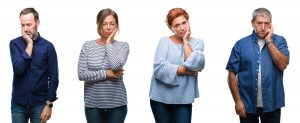 Is aging itself a disease? And if so, can we figure out a way to cure it? If you’ve heard that people don’t die of old age, they die of diseases, you might want to think differently. Although older adults come down an array of degenerative conditions, the reason they do is because things go wrong on a cellular level.
Is aging itself a disease? And if so, can we figure out a way to cure it? If you’ve heard that people don’t die of old age, they die of diseases, you might want to think differently. Although older adults come down an array of degenerative conditions, the reason they do is because things go wrong on a cellular level.
Human cells work according to biochemical and physical processes but they seem to breakdown with aging. Older cells are prone to mitochondrial dysfunction, cellular senescence, and free radical damage. Much of the dysfunction can be influenced by diet and poor health habits like being sedentary.
Aging Is a Disease of Loss of Energy
If we can find a way to eliminate these causes of cellular aging, then seniors won’t be as easily afflicted with diseases. Award winning biochemist Earl Stadtman is quoted as saying
“Aging is a disease. The human lifespan simply reflects the level of free radical damage that accumulates in cells. When enough damage accumulates, cells can’t survive properly anymore and they just give up.”
In 1972 scientists proposed calling this process the mitochondrial theory of aging. Free radical damage to your cells’ power source, known as mitochondria, leads to a loss of cellular energy and function over time.
I like this explanation from Dr. Michael Greger (How Not to Die):
This process may be a little like charging your iPod battery over and over—each time, its capacity gets less and less.
Your mitochondria take electrons from plants and use them as an energy source in a controlled manner, a little at a time until the energy is used up. Oxygen loves electrons, and when it gets a chance to grab an electron, it turns into superoxide, a type of destructive free radical.
As such, the molecule becomes unstable and violently reactive. When it comes into contact with DNA, it can damage your genes and cause mutations in your chomosomes that may lead to cancer.
Antioxidants to the Rescue
The body calls in its defense squad, known as anti-oxidants. The process whereby oxygen molecules grab stray electrons and become menacing is called oxidant or oxidative stress. The resulting cellular damage is what essentially causes aging.
Aging and disease are the result of oxidation of the body. Have you got any brown spots on the back of your hands? That’s oxidative fat under the skin. Oxidative stress is why we get wrinkles, lose memory, and why our organs systems break down as we get older. Basically, we’re rusting.
What’s the Cure for Aging?
If you want to know more about mitochondria, free radical damage, and how cells die, refer to Dr. Google, any of the health sites, or good old Wikipedia. I understand it a little, but am continuing to learn everyday.
What’s important to know for seniors is that we have the knowledge about how cells age and deteriorate. Thus we can practice anti-aging strategies in our daily lives—even without understanding the biochemical mechanisms.
My Biggest Clue that I Was Aging
For me, I realized I was aging when I first noticed a lack of my usual energy and drive. In my 50s, I was passionate about my work, my tennis, and a few other things. But there were an increasing number of days when I would sit without doing anything. I wasn’t ill, I wasn’t depressed, I wasn’t in the least bit bored (although I wondered about those possibilities.) I was simply tired.
My number of active hours went from 10 down to eight, then to five or six. The rest of the time I wasn’t productive, although I did spend considerable time reading. These feelings of fatigue are common among seniors.
What I read surprised me. Human energy comes from a biochemical cascade inside our cells. Food is broken down, circulated, enters cells and then enters tiny organelles called mitochondria. They turn food sources into fuel.
Seniors Are Not Lazy
Loss of energy for what our previously normal capacities were is wide-spread among seniors. It fuels sedentary behaviors. It leads to less physical exercise even when we know exercise is preventative and can ward off diseases.
It often leads to poor dietary choices because we just don’t feel like cooking nutritious meals. We eat processed meals or junk food.
Seniors are NOT lazy, although we may tell ourselves we are. We are dealing with aging cells that zap our energy fuel and leave us sitting there in our recliners watching Netflix. The odd things is the more you say NO! to sitting, the more your cells get to work to provide the energy required.
I say don’t give in. I know it’s hard, but get up and get moving. Until they find a cure for aging, a diet with lots of fruit and veggies, willpower and gumption may be the answer. If only I can remember where I put my gumption…!

Recent Comments